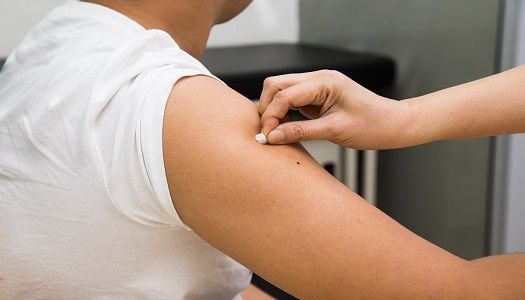High Expectations Surround Trial for Mosquito-Borne Diseases Vaccine
The NIAID is enrolling participants to receive two AGS-v injections.

Officials at the National Institute of Allergy and Infectious Diseases (NIAID), part of the National Institutes of Health (NIH), are launching a trial for a vaccine to protect against mosquito-borne diseases—including malaria, dengue fever, Zika, and West Nile fever.
“Mosquitoes cause more human disease and death than any other animal,” Anthony S. Fauci, MD, director of the NIAID, said in a news release.
The phase 1 clinical trial is one of the first steps in examining human outcomes with investigational vaccine, AGS-v. Developed by London-based pharmaceutical company SEEK, researchers believe the vaccine will be able to hinder the mosquitoes’ ability to transmit infections.
The researchers will observe if the vaccine design works to generate an immune response to mosquito saliva, which is different from other vaccines for specific mosquito-borne diseases which target a specific virus or parasite carried by mosquitos. The vaccine consists of four synthetic proteins from mosquito salivary glands and are meant to induce antibodies. It’s also designed to induce a modified allergic response which can prevent infections from a mosquito bite.
Up to 60 healthy adults ages 18 to 50 will be enrolled in the double-blind study. They will be randomly assigned to one of three groups: two injections of the AGS-v 21 days apart, two injections of AGS-v combined with an adjuvant 21 days apart, and two placebo injections 21 days apart.
Blood samples and physical exams will take place twice after the first vaccination and twice after the second vaccination. In addition, about 21 days after the second vaccination, participants will be exposed to biting Aedes aegypti mosquitoes which aren’t carrying illness. Blood samples will be taken at various points of the 20-minute exposure to evaluate modified responses caused by AGS-v. The team hypothesizes that mosquitoes that bite participants who were vaccinated with ASG-v may have different behavior which can inhibit their ability to reproduce or result in early death and, therefore, reduce disease transmission. Follow-up will continue every 60 days for five months. Ten months after the mosquito exposure, there will be a final follow-up to evaluate long-term safety.
The phase 1 trial is currently recruiting participants and expected to be completed by summer 2018.
“A single vaccine capable of protecting against the scourge of mosquito-borne disease is a novel concept that, if proven successful, would be a monumental public health advance,” Fauci continued.
The trial is led by Matthew J. Memoli, MD, director of the Clinical Studies Unit in NIAID’s Laboratory of Infectious Diseases, and taking place at the NIH Clinical Center in Bethesda, Maryland. The news release was provided by the NIH.
Related Coverage:
Trump’s Vaccine Theories Alarm Docs